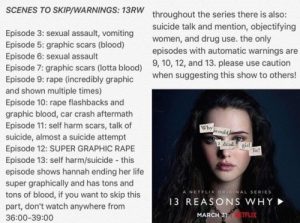When Selena Gomez, decided to produce the Netflix’s adaption of the novel 13 Reason’s Why, she set out to create a show that spread the awareness of the dangers of suicide. Although she was successful in making suicide a more talked about subject, suicide has now fallen into the realm of reality of some youth. The series followed a teenager named Hannah Baker, and her journey throughout high school which was seemingly filled with turmoil and chaos. Following the many obstacles she faced throughout her life, Hannah committed suicide which was graphically depicted towards the end of the season. There was no trigger warning for those who were sensitive to such material. The very vivid depiction of suicide was intended to illustrate the severity of suicide. Instead, youth seemed to respond to the show under a false consensus.
A false consensus is the idea that individuals have the tendency to follow a belief they believe the majority also shares, in other words it is when an individual believes their belief to be conventional and common. This was a concept prevalent amongst viewers of the show in that it is likely that since suicide was portrayed in the show as the most practical solution by a very relatable character, young viewers going through a similar situation may have glorified suicide. This possibly drove viewers to deem their urges for suicide as the norm. It is feasible they jumped to the notion that other views may share similar beliefs and they’re probably also taking after the main character, Hannah Baker. This is a very practical reasoning for the strong correlation between the airing of the series as well as the upsurge of searches on how to commit suicide. According to the Huffington Post, researcher found that Google searches pertaining to phrases such as “how to commit suicide” increased by a frightening 26% along with similar Google searches also increased following the airdate of the series. This sudden growth of Google searches that followed the airing of the series was perchance due to young teens falling victim to the false consensus effect.
In a report conducted by Florian Arendt and Sebastian Scherr, examined the aftermath and effects that followed the suicide of celebrity, Robin Williams. According to the report, although the suicide of the actor spread awareness for suicide, it also proved to have several risk elements to it as well. In the report, search engines were monitored ad examined both before and after the publicized suicide and it was discovered that following it was an increase in harmful searches which included “commit suicide”. It was noted that the amount of query shares, or the total volume of harmful searches divided by the number of queries in the region which including “commit suicide”. It was show that it had rose drastically and doubled from the ten days prior to the ten days that followed. The conclusion drawn from this study was that the highly publicized suicide of Robbin Williams seemed to cause a rise in the amount of searches on suicide and commit it. Much like the series, it is possible that since many seem to form connections with celebrities and characters, they seem to feel the inclination to also follow in their footsteps and solve their own problems the way the person they look up to would. It is evident that the discussion and/or depiction of suicide in shows or in media has the ability to influence people in a negative manner which raises the question, why aren’t there more trigger warnings?
References:
Ahsan, S. (2017, August 01). Did 13 Reasons Why lead to a rise in suicide rates? Retrieved September 27, 2017, from http://nationalpost.com/entertainment/television/did-13- reasons-why-lead-to-a-rise-in-suicide-rates
Holmes, L. (2017, August 02). ’13 Reasons Why’ Led to A Major Increase in Suicide Internet Searches. Retrieved September 27, 2017, from http://www.huffingtonpost.com/entry/13- reasons-why-suicide-search_us_5980808be4b0d6e28a107dbe#
Arendt, F., & Scherr, S. (2017). The impact of a highly publicized celebrity suicide on suicide-related online information seeking. Crisis: The Journal Of Crisis Intervention And Suicide Prevention, 38(3), 207-209. doi:10.1027/0227-5910/a000455
Shannon Luke


